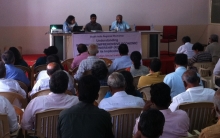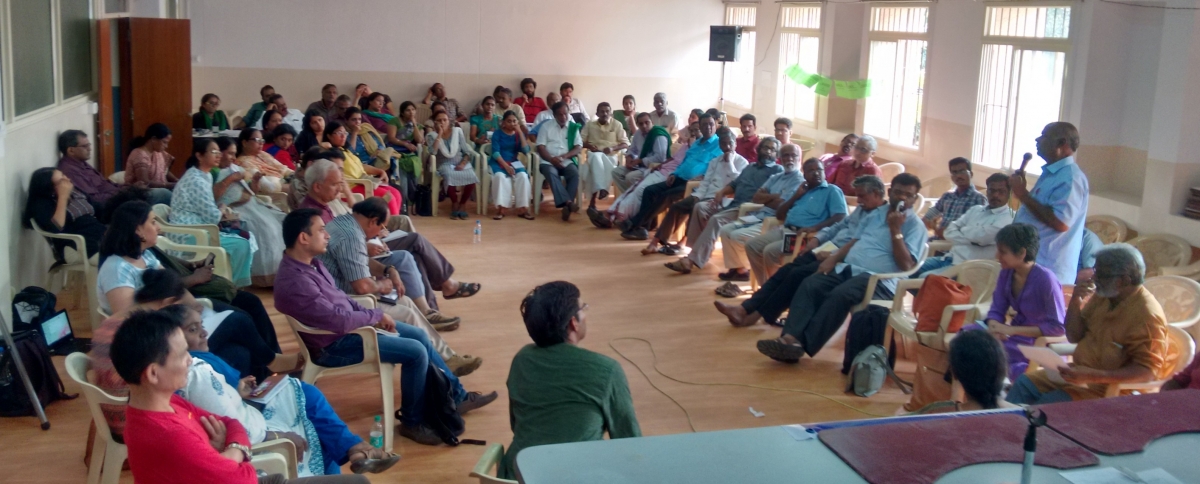Trade unions and farmer groups reject RCEP


The gathering, held on 2-3 April in Bengaluru, India, raised concerns that, if signed, RCEP would allow foreign investors to sue governments, restrict policy space for governments, promote privatisation of essential services, threaten access to life-saving medicines and put manufacturing jobs, rural livelihoods and seed sovereignty at risk.
"The presence of international healthcare companies is increasing in India, evident in the presence of companies like Malaysia’s Columbia-Asia and the Singaporean IHH Health Berhard. Foreign investment in the sector is also increasing and grew by 27 per cent annually in the period between 2010 and 2014. Close to 80 per cent of this was equity investment. Entering into an agreement that will curtail the government’s ability to regulate the private healthcare sector and strengthen the so-called rights of investors will impact both workers and patients”, said V. Narasimhan, India country representative of PSI.
Anand Grover, senior lawyer and former UN Special Rapporteur on Right to Health pointed out, “India supplies cheap generic medicines across the developing world. Japan and South Korea are demanding strict patent laws that will raise the cost of affordable medicines which will impact patients in India and the developing world.”
"Affordable medicines from Indian generics helped in making HIV treatment available to nearly 17 million patients worldwide. Today, people living with HIV are facing increased mortality rates because of co-infection with Tuberculosis or Hepatitis-C. There is a lack of access to new medicines to treat these diseases because of patent monopolies resulting in high prices or regulatory barriers. We are worried that the heightened Intellectual Property provisions being negotiated in RCEP, if accepted, would further extend monopoly protection beyond what is required and keep medicines out of reach for us for a longer period of time", added Firoz Khan, National Coalition of Positive People on India (NCPI+).

“Farmers in India have already borne the brunt of existing FTAs such as the ASEAN-India FTA and India Sri-Lanka FTA. Cheap imports of palm oil, pepper and tea have devastated lives of peasants across South India. The RCEP will further aggravate this crisis. We reject the RCEP outright”, said KT Gangadhar, President of KRRS (Karnataka Rajya Raitha Sangha).Burnad Fatima of Asia Pacific Forum on Women, Law and Development (APWLD) added, “Women lead subsistence based agriculture which guarantees food security and nutrition of their communities but RCEP negates this and invites foreign trade to plunder the sovereign status of women farmers, stopping them from sharing and any traditional and indigenous knowledge, and allowing corporation to take over common resources like water, forest and land. Women from the margins – rural poor, Indigenous and Dalit women are the worst affected. We resist and say 'No RCEP'."
PSI’s delegation represented sectors such as municipalities, health, and insurance, and included Ms T Dakshayani, Ms Yashodhamma KJ and Ms MC Gavathri, from Karnataka State Government Employees Association (KSGEA), Ms Abha Chaturvedi, from Hind Mahila Sabha (HMS), Mr Adil Shariff, from the Indian National Municipal & Local Bodies Workers Federation (INMLBWF), Mr Prakash Devdas, from Mumbai Mahanagar Karmachari Mahasangh (MMKM), Mr R Balakumar, from Indian National Defence Workers Federation (INDWF), and was led by Mr V Narasimhan, from the All India National Life Insurance Employees Federation (AINLIEF).
As the Indian Government prepares to host the 19th round of RCEP negotiations in Hyderabad in July, participants were concerned that India’s federal decision-making process - whereby state governments have considerable autonomy over policies in agriculture, health, education and labour - will be compromised by India’s commitments in RCEP. Further, the investor state dispute settlement (ISDS) clause in the proposed agreement will undermine the Indian government's ability to protect citizens’ rights over corporate greed for profits.
The group concluded with an unequivocal call for the rejection of RCEP.
For more details please contact: Susana Barria - susana.barria@world-psi.org
More information:

